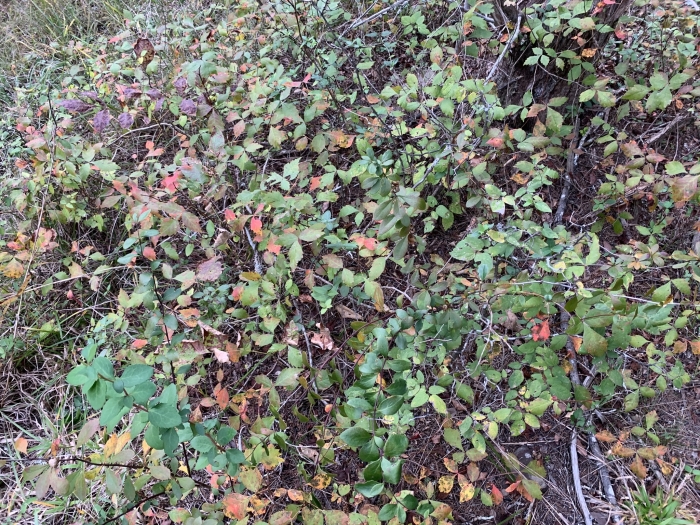American Barberry
(Berberis canadensis)
American Barberry (Berberis canadensis)
/
/

Ashwin Srinivasan
CC BY 4.0
Image By:
Ashwin Srinivasan
Recorded By:
Copyright:
CC BY 4.0
Copyright Notice:
Photo by: Ashwin Srinivasan | License Type: CC BY 4.0 | License URL: http://creativecommons.org/licenses/by/4.0/ | Rights Holder: Ashwin Srinivasan | Publisher: iNaturalist | Date Created: 2022-10-07T21:07:04Z |





















Estimated Native Range
Summary
Berberis canadensis, commonly known as American Barberry or Allegheny Barberry, is a deciduous shrub native to the rocky slopes and dry woodlands of the eastern United States. It typically grows up to 7 feet tall and can spread by rhizomes to form extensive thickets. The shrub features alternate, thin, smooth leaves that are green in spring and summer, turning to attractive shades of yellow, orange, or red in the fall. From April to May, it produces small, yellow flowers arranged in drooping racemes, which are followed by bright red, oblong berries that persist into winter and are edible, rich in vitamin C.
American Barberry is valued for its ornamental qualities, including its vibrant fall foliage and red berries, which provide winter interest in the garden. It is used in naturalistic plantings, as a border shrub, and for wildlife habitat restoration. This shrub prefers full sun to part shade and is adaptable to a variety of soil types, though it thrives in well-drained, slightly acidic soils. While it is drought-tolerant once established, regular watering during prolonged dry periods will keep it looking its best. Gardeners should be aware that American Barberry can host the black stem rust of wheat, which has led to its control and eradication in some areas to protect cereal crops. Despite this, it remains a useful plant for erosion control on slopes due to its spreading habit.CC BY-SA 4.0
American Barberry is valued for its ornamental qualities, including its vibrant fall foliage and red berries, which provide winter interest in the garden. It is used in naturalistic plantings, as a border shrub, and for wildlife habitat restoration. This shrub prefers full sun to part shade and is adaptable to a variety of soil types, though it thrives in well-drained, slightly acidic soils. While it is drought-tolerant once established, regular watering during prolonged dry periods will keep it looking its best. Gardeners should be aware that American Barberry can host the black stem rust of wheat, which has led to its control and eradication in some areas to protect cereal crops. Despite this, it remains a useful plant for erosion control on slopes due to its spreading habit.CC BY-SA 4.0
Plant Description
- Plant Type: Shrub
- Height: 2-4 feet
- Width: 2-3 feet
- Growth Rate: Moderate
- Flower Color: Yellow
- Flowering Season: Spring
- Leaf Retention: Deciduous
Growth Requirements
- Sun: Full Sun
- Water: Medium
- Drainage: Medium, Fast
Common Uses
Border Plant, Deer Resistant, Drought Tolerant, Low Maintenance
Natural Habitat
Rocky slopes and dry woodlands
Other Names
Common Names: American Barberry, Canadian Barberry
Scientific Names: , Berberis canadensis, Berberis angulizans hort., Berberis angulizans hort. ex, Berberis brevifolia, Berberis canadensis, Berberis caroliniana, Berberis caroliniana var. macrocarpa, Berberis fischeri, Berberis integerrima
GBIF Accepted Name: